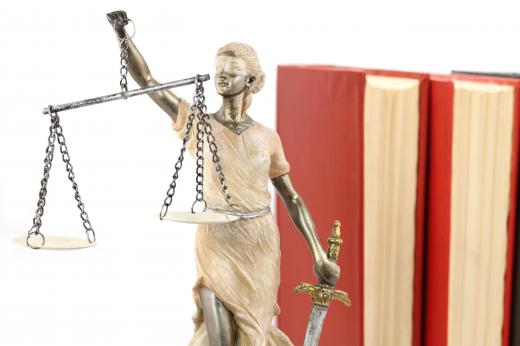At MyLawQuestions, we're committed to delivering accurate, trustworthy information. Our expert-authored content is rigorously fact-checked and sourced from credible authorities. Discover how we uphold the highest standards in providing you with reliable knowledge.
What Is Crime Control?
Crime control can have several distinct meanings that relate to the central provision of managing the criminal justice system and preventing crime. In a general sense, crime control can mean anything from how police departments are organized to how illegal acts are classified. There is also a theory of criminal and legal management known as the crime control model, which stresses the prevention of crime over the importance of civil liberties.
Crime is endemic to society, as far as history can show. There has never been a human society without some level of crime, though the motivations, definitions, and punishments have varied extensively. A large part of the development of human civilizations has arisen from the desire of leaders to reduce, control, and punish crime. The evolution of controlling crime has played as important of a part in history as the development of agriculture, technology, or medicine. It has started and ended wars, lead to mass executions, mass pardons, and justifications for genocide.

On a basic local level, crime control may refer to the system of laws and law enforcement in a localized area, such as a town or county. Controlling crime may include actions directly related to criminal activity taken by officials, such as criminal investigation, arrests, and court procedures. It may also include preventative measures, such as after school programs for high-risk youths, community education, and statutes such as curfews. It may also refer to crime management actions taken by the non-official public, such as through the creation of neighborhood watches and other community-based preventative programs.

On state and national levels, crime control performs much of the same function as local efforts, but on a wider and more complex scale. At the national level, it may include significant research into crime statistics across the territory and the division of assets accordingly. National laws and programs can also create target areas for both state and regional, as well as international, crime control to focus on, such as the United States' "War on Drugs."

The model does not refer to the specific policies of a crime management system, but instead is a philosophy meant to influence how crime control systems are structured. The basic principle of the theory is that the rights of the public to safety are more important than the rights of the criminal. It is often cited in contrast to a competing theory, known as the due process model, which stands on the idea that criminal justice systems are prone to mistakes, and that significant effort must be put forth into determining the true guilt of a defendant. These systems are sometimes referred to as the “guilty until proven innocent” and “innocent until proven guilty” theories.
AS FEATURED ON:
AS FEATURED ON:














Discussion Comments
@Scrbblchick -- That's a great idea! Maybe I'll write a letter to the editor suggesting that.
We have several bilingual officers on our police force, and that does seem to cut down on the numbers of arrests made because of a lack of communication.
One thing our police department has done is to train all the officers in how to deal with someone who may be mentally ill or disabled. That's defused several bad situations over the past couple of years.
Now they just need to crack down on all the one-pot meth labs. If that's even possible.
Our police chief feels one good form of crime control is for officers to have regular neighborhoods they patrol. They're encouraged to get to know residents personally, so people feel comfortable coming to them when they see or find out about something going on.
It's really worked because the officers have become a part of the neighborhood, and they know immediately if something is out of place, or if someone strange is hanging around and doesn't belong there.
We have had a drop in property crimes, and in things like fights and assaults since they started this program.
Post your comments